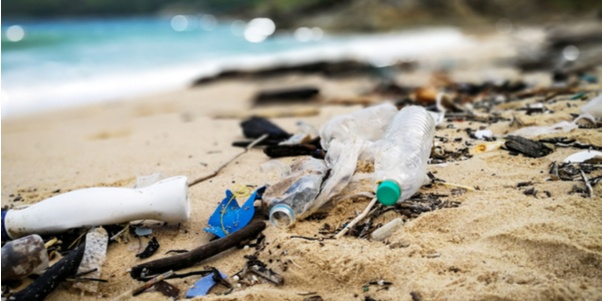Environmental advocacy in business surprisingly still divides opinions.
While many are avid proponents of more environmentally responsible business practice, others are still very much in favour of the ‘volume = profit’ business model.
Produce as much as you can for as little as you can. Which usually means, use plastic.
One plastic bottle can take up to 1,000 years to biodegrade, with glass bottles taking up to 1,000,000 years. Coupled with the rate at which we are producing, consuming and disposing of such waste, the environment, wildlife and we, are in trouble.
The good thing is that by adopting a more environmentally responsible approach, you could see some compelling business benefits. In an age where we are becoming increasingly more passionate about protecting the earth, new generations, in particular, want to actively demonstrate change.
Peter Prior, General Manager of Bullseye Distributors - a member of Bedfordshire Chamber of Commerce - kindly offers his perspective on businesses using more sustainable methods of packaging.
In Peter’s words, “You should be doing it, it’s as simple as that. If it costs an extra 2p per item to source biodegradable packaging, find that money. We’re talking about the earth.”
Bullseye Distributors are a biodegradable packaging supplier, offering paper and pulp alternatives to plastic food packaging that are not just kinder to the environment, but more practical, reusable, and arguably, better for our health. The packaging they produce is created from paper and pulp only, and is 98% biodegradable, with a selection of 100% biodegradable products.
Having just returned from India, Peter learned that one beach in Mumbai had produced 12,000 tonnes of plastic in a year, which highlighted the urgency for action here in the UK. While in India, Peter gained the interest of the CEO of a large food manufacturer, who is now looking to diversify his business to become the first biodegradable packaging company in India.
India has just announced an initiative to ban the use of disposable plastic, in the hope of eradicating single-use plastic entirely by 2020, and Peter wants to see this attitude reflected in the UK.
This view echoes that of Iceland managing director, Richard Walker, who claims “there really is no excuse anymore for excessive packaging which produces needless waste and damages our environment.” A comment that follows Iceland's pledge to eliminate plastic on all their own-brand products.
Competitive edge
As food giants including Tesco, Asda, Morrisons, Iceland and Lidl have all signed up to the UK initiative to rid their supermarkets of avoidable plastics, other businesses are under pressure to follow suit.
Consumer point of view is central to driving sales, and as knowledge of the epidemic rises, consumers will be more inclined to buy from environmentally responsible retailers.
A Unilever report found that a third of global consumers prefer sustainable brands, proving that any investment in more eco-friendly packaging could result in substantial returns.
An environmentally conscious culture
Biodegradable packaging solutions create opportunities for businesses in a culture that is increasingly focused on making change. It is said that as younger generations approach the workforce, they are more attracted to companies that demonstrate environmentally conscious initiatives.
The fact that pollution is set to increase the number of premature deaths globally by 2050 means that new generations such as millennials and generation Z are much more concerned about how they consume, dispose and protect the environment than previous generations.
Advocacy is therefore central to driving brand affinity, as well as sales. These generations are especially passionate about the environment, and are more aware than ever of the effects of irresponsible waste disposal, growing up in the midst of an environmental epidemic. In order to appeal to newer generations, businesses must demonstrate an active response to environmental issues.
Much to still be learned
Turns out, there’s still a lot people don’t know about recycling. For example, the trackers are infrared and do not recognise black plastic, so all black plastic is sent to general waste.
Additionally, if there is any food waste left inside the plastic these also won’t be recycled, so be sure to thoroughly rinse out any containers or tins before they make their way into your recycle bin.
Business owners are also concerned with the amount of profit loss they might face switching to more biodegradable options. Peter reassures, “Smaller businesses shouldn’t notice any substantial financial impact since they order such small volumes in comparison to larger food manufacturers.”
And lastly, do be aware cardboard does still take time to break down, so we should always dispose of it in a respectable and responsible way too.
The rise of single-use plastic, irresponsible disposal, and generally a lack of knowledge when it comes to recycling are all contributors to the slow demise of our wildlife, oceans and land. But there is time to start reversing the problem. We need to act now before this starts to have more of a daily impact on our lives, but raising awareness is vital. Big brands and businesses have an onus to start demonstrating more responsible treatment of the environment, and in doing so, others will follow suit.
Ultimately, if you’re not doing it for the environment, do it for the wildlife; and if not for the wildlife, do it for yourself.




![The Bedford College Group logo [WHITE]](https://www.chamber-business.com/hs-fs/hubfs/The%20Bedford%20College%20Group%20logo%20%5BWHITE%5D.png?width=139&height=81&name=The%20Bedford%20College%20Group%20logo%20%5BWHITE%5D.png)
